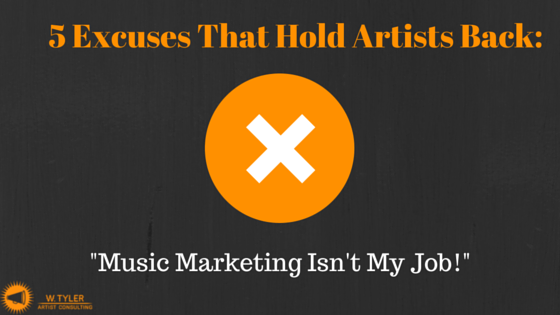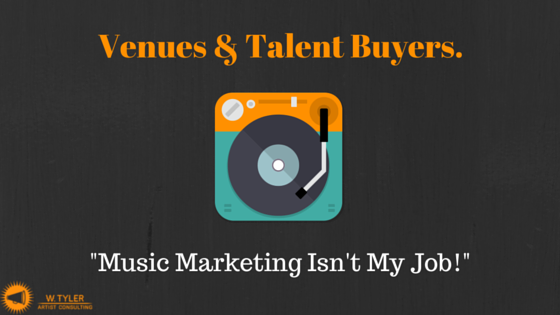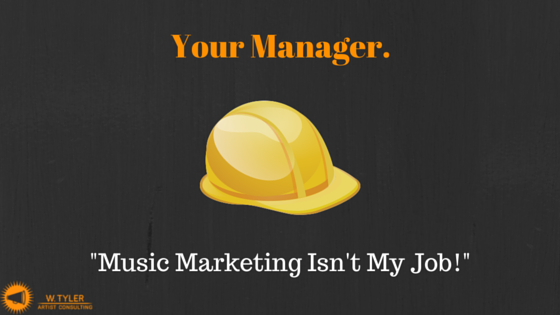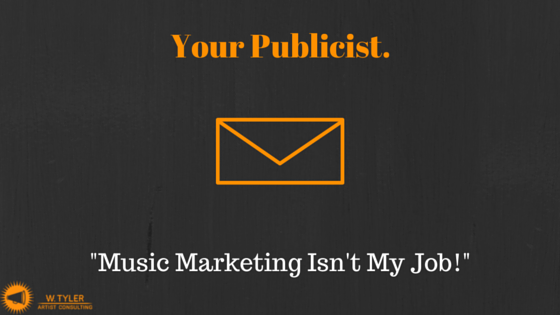Okay, okay, okay.
This excuse makes me mad, sad, and a little frustrated.
It’s the type of excuse that keeps me up at night.
It’s the type of comment that baffles me and seriously makes me contemplate leaving the marketing world and go start an apple orchard, or something less mentally exhausting.
But first, let’s recap. In the past two installments we discussed the following myths:
Nope! While you can get a lot out of properly investing in your work, some of the best marketing can be 100% organic and free.
Again, false. While yes — the more time you can put into marketing your work the better, there’s a lot you can do in just one hour a day.
But this week we’re covering this “excuse”.
“I’m not a promoter. Marketing my music isn’t my job.”
See up there? See how I put the word “excuse” in quotes? I did that because it’s more than an excuse, it’s actually just a terrible, terrible attitude.
This was recently brought to my attention when a friend of mine, El Williams of New Orlean’s SoundClash showcase. He was talking about how happy he was that an artist actually made online flyers and ads for their upcoming performance.
I asked him how common this was… and what he told me, still, weeks later, has resonated with me. He claims that a lot of artists tell him that they’re “not promoters” and it’s not their jobs to get butts in seats. It’s the venues job. This was later echoed by another friend of mine who owns a rather popular rock venue in NYC. He says he hears this quite a bit, that most artists think that it’s 100% on the venue to promote the event.
But here’s the truth: Any aspect of your career, from marketing to production, needs your touch.
I’ve spoken before about how you, the artist, are your own CEO. While it’s great to have a team, you still need to be involved in every process, even if it’s a sign-off. The more power you give to someone else the less you begin to grow as an artist.
Here’s an analogy:
Let’s say you’re the CEO of a tech company (or insert any other company, really), and you’re launching a new product next month. Are you going to say, “Marketing it? Meh, the marketing team handles that.” Or are you going ask the marketing team what they have planned, review it, and sign off on it?
If you’re a good CEO, likely the second right? You are going to make sure your entire team and outside vendors are on-point before launch.
You’re an artist, your music is your product. As the CEO of your art, shouldn’t you be seeing how well your product is being marketed? That might mean checking in with the venue to get a clear vision of co-marketing, or ensuring your publicist is hitting the right outlets. It might even mean making sure your manager is on-top of publishing for your next roll-out.
You don’t have to do it all, but you certainly need to make sure that your process is moving.
And the venue thing? What’s the best way to be invited back to a show? What’s the best way to make money?
By establishing good relationships, and by making damn sure your show sells out.
You don’t get invited back by telling the venue, “I’m not a promoter”.
Now, I don’t think that this mindset is the majority, I really don’t. But it brings up a larger topic of well, what is my job? And what are the jobs of others?
Venues and Talent Buyers.
What Their Role Is:
To book gigs that will bring in people, boost drink sales and make a profit for the venue. While it is in their best interest to market the gig, the variance of depth will depend on their ad budget and overall expertise in marketing.
In a perfect setting, a venue will create a physical and online flyer for the show, put some form of advertising behind it, as well as help to book you on local radio shows/outlets.
However, if a venue does ANY of the above, that’s better than no cooperation at all. Make sure there’s a clear understanding.
What Their Role Is Not:
The venue is not your promo or marketing team. They are an outside vendor looking to collaborate to find income and success for themselves and the artist. If they have the budget and means, yes it’s in their best interest to promote you, but every venue is going to act differently.
How To Work Together:
First things first, understand that you are supposed to be working together. Everything in this business is about collaboration.
Secondly, simply tell (don’t ask) the venue what you’re doing to promote the gig. Then, ask for their assistance where ever possible, and what they plan on doing.
For instance:
“For this performance, we will be making online flyers for our social media, as well as contacting local press for promo and interview spots.
We’re a bit new to the area, so if you have any press contacts, feel free to send them over. Also, will your venue be doing any graphics? If so, we can share those on social media, too.
Please let us know how you guys are working to market the show, and we can collab on any co-marketing ideas. Thanks!”
Be grateful. They’re giving you a stage (and hopefully) money — act like the professional you are, even if it doesn’t go as planned.
Your Manager.
What Their Role Is:
Your manager’s job is to make sure you’re making proper business choices. They’re also the person that presents you with various options, as well as their personal recommendations.
Their job is also to ensure that everyone on your team is working appropriately: your publicist is making the right lists and pitches, your designers are making the appropriate content, that your social media channels are on-point.
Even if it’s just you and your manager, and no one else on the team, they still exist to make sure your brand, vision, and plans are on-point.
They should be the one assisting with a business plan and roll-out plan, and making sure you’re on the right path.
What Their Role Is Not:
Their job isn’t to do all the stuff that you don’t want to do.
A lot of artists drop a single, and it’s like the next thing they think they have to do is hire a manager. However, every artist should take the time to learn the business, so that way, they can ensure their manager is actually making proper choices.
You, the artist, are the CEO, and need to be able to understand what your manager is actually doing, supposed to do, and if they’re on track.
Your manager isn’t your personal assistant. I’ve seen artist refer fans to their “management” when all a fan did was ask for a merch link.
I’ve seen managers refer to their “management” when asked simple questions about show dates.
Take control, your manager isn’t your puppet master, they work for you. But only if you genuinely understand your craft.
How To Work Together:
Your manager needs to develop a plan, and at the very least, have an updated status document in Google Drive.
This way you and your manager can keep your eye on thoughts, ideas and next steps. For instance, you might have a show coming up — so add all your “to-dos” in the status document.
Contact designer for upcoming show graphic.
Ensure merch is printed by 5/15.
Run ads in advance for the show.
In that same document, put out who is responsible too, and simply keep that bad-boy updated.
As I drilled into the ground before, your manager shouldn’t be running your career, they should be helping YOU to achieve your goals. Work together to discuss the vision.
Your Publicist.
What Their Role Is:
Your publicist could be an on-going team member, or just someone you work with as-needed. However, there is still often some miscommunication about their role.
Your publicist’s job is to make sure your work is featured in press. They may also give you recommendations for social media as well as ads — but for the most part, their job is to secure you interviews and media coverage.
What Their Role Is Not:
Their job is not to blast out your SoundCloud link to 800 writers. Their job is to develop a pitch, and customize it to the outlet, and develop a genuine relationship on your behalf.
Their role also isn’t to 100% guarantee placements. Every genuine publicist gets a little antsy when the client asks: “Accuracy?”. Because you could have an amazing relationship with a writer, but if they/their editor doesn’t see it as a fit, then there’s nothing you can do about it.
Now, a good publicist will be honest with you and tell you what needs to be fixed before taking the product to press, and a good publicist will have a great pitch that reels the writer in — but regardless, understand that a publicists role is to get you placed, not work miracles.
(Their role is to also continue pitching, reframing until you get pick-ups, too. So, keep that in mind!)
How To Work Together:
Communicate!
Develop clear goals, tell the publicist which outlets you’re interested in, and understand if they say those might be tough to break int0.
They should also let you know the process, whether that’s straight up giving you access to a media list (rare) or giving you a status update on progress, they need to keep you in the loop.
They’ll also likely suggest edits to your EPK, and they should also let you know their pitch. Keep those in mind when collaborating.
—
These are just a few ways to understand collaboration, and how to work with others. This industry is all about relationships — and that’s not some corny, networking talk. It’s true, you need to maintain connections, even if it’s just good business relationships.
Don’t ruin a path, or opportunity, because you don’t think it “falls under your job description”. Your job description in the industry is simple: Do work, stay on track.
Further Reading:
5 Excuses That Hold Artists Back: Marketing is Too Expensive
5 Excuses That Hold Artists Back: I’m Too Busy to Market My Music




